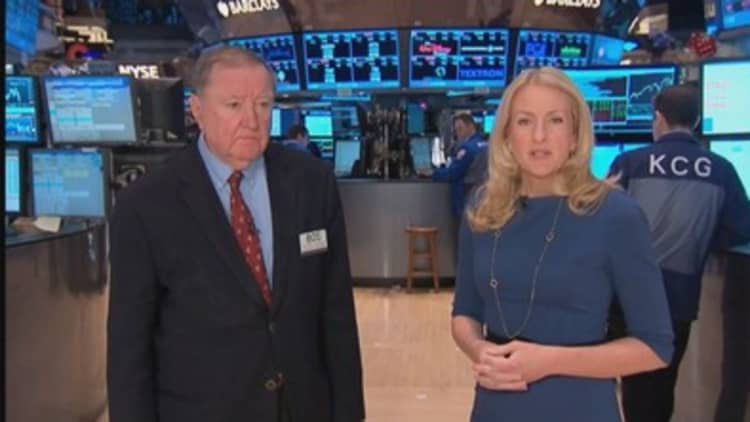
U.S. stocks declined on Wednesday afternoon, a day after the S&P 500 took its biggest hit in more than three weeks, as the energy sector expanded losses after U.S. crude settled at its lowest since March 2009.
The Federal Open Market Committee stuck to its vow to be "patient" on hiking interest rates and raised its view of the economy and labor market, even as the central bank said it anticipates inflation to fall further in the near term.
"The Fed did lean towards letting the market know it's likely to remain accommodative; the real debate is going to take place in June," Michael Arone, chief investment strategist for State Street Gobal Advisors' U.S. intermediary business.
Boeing rose after the jet manufacturer and Dow component posted quarterly profit that surpassed estimates.
The CBOE Volatility Index, one measure of investor uncertainty, jumped 19 percent to 20.44.
A day after disappointing reports from multinationals, Apple's stunning results brought temporary relief.
"Apple's results were unapologetically fantastic and Boeing reported impressive results," said Jim Russell, portfolio manager at Bahl & Gaynor, referring to the timing of rate hikes by the central bank.
Read MoreApple just a bit of a respite from currency concerns
"The dollar strength has been in the past a catalyst for some pretty nasty downturns. A strong dollar in a world where the global tide is not rising makes it difficult to increase your slice of the pie," Jack Ablin, chief investment officer at BMO Private Bank, said.
On Wednesday afternoon, the Federal Reserve concludes its first two-day policy session of 2015, saying the timing of rate hikes depends on economic data.
"There is a legitimate case for them to hold off, and a legitimate case for the middle of the year," Russell said of the timing of rate hikes by the central bank.
Major U.S. Indexes
After rising 97 points and falling 198, the Dow Jones Industrial Average ended down 195.84 points, or 1.1 percent, at 17,191.37.
The fell 27.39 points, or 1.4 percent, to 2,002.16, with energy the worst performing and technology the sole sector advancing of its 10 major industry groups.
The Nasdaq shed 43.50 points, or 0.9 percent, to 4,637.99.
For every share rising, roughly three fell on the New York Stock Exchange, where nearly 857 million shares traded. Composite volume surpassed 4 billion.
The U.S. dollar gained against the currencies of major U.S. trading partners while the yield on the 10-year Treasury note fell 10 basis points to 1.7201 percent.
Dollar-denominated commodities including oil and gold declined on the New York Mercantile Exchange, where crude futures for March delivery declined $1.78, or nearly 4 percent, to $44.45 a barrel and the February gold contract shed $5.80 to $1,285.90 an ounce.
On Tuesday, U.S. stocks dropped sharply as corporations reported earnings that disappointed and orders for U.S. business equipment unexpectedly declined in December.
Read More Stocks end lower; Caterpillar, Microsoft disappoint
Coming Up This Week:
Wednesday
2 p.m.: FOMC announcement
Thursday
8:30 a.m.: Weekly jobless claims
10 a.m.: Pending-home sales for December
Friday
8:30 a.m.: Fourth-quarter GDP
9:55 a.m. Consumer-sentiment index for January
More From CNBC.com:



